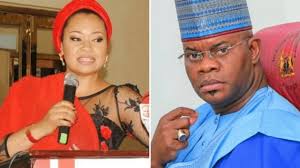Nation
‘Nigeria Becoming Failed State’
The Financial Times of London has described Nigeria as a country going backwards economically and plagued with terrorism, illiteracy, poverty, banditry, and kidnapping and risks becoming a failed state if things don’t take a drastic turn.
The UK-based newspaper said this in an editorial yesterday titled, ‘Nigeria at Risk of Becoming a Failed State’.
It said the abduction and subsequent rescue of over 300 schoolboys in Kankara, Katsina State, revived memories of the 276 Chibok schoolgirls abducted in Borno State in 2014.
According to the newspaper, while the government’s claim that no ransom was paid to the abductors of the schoolboys remains doubtful, other acts of criminality could not be overlooked.
The editorial read in part. “The government insists no ransom was paid. Scepticism is warranted. In a country going backwards economically, carjacking, kidnapping and banditry are among Nigeria’s rare growth industries. Just as the boys were going home, Nigerian pirates abducted six Ukrainian sailors off the coast.
“The definition of a failed state is one where the government is no longer in control. By this yardstick, Africa’s most populous country is teetering on the brink.”
The newspaper also questioned the claim by the President, Major General Muhammadu Buhari (retd.), that Boko Haram had been technically defeated.
It said contrary to the government’s claim, Boko Haram remained an ever-present threat.
The Financial Times stated, “President Muhammadu Buhari in 2015 pronounced Boko Haram technically defeated’. That has proved fanciful. Boko Haram has remained an ever-present threat. If the latest kidnapping turns out to be its work, it would mark the spread of the terrorist group from its north-eastern base.
“Even if the mass abduction was carried out by ‘ordinary’ bandits — as now looks possible — it underlines the fact of chronic criminality and violence. Deadly clashes between herders and settled farmers have spread to most parts of Nigeria. In the oil-rich, but impoverished, Delta region, extortion through the sabotage of pipelines is legendary.”
The newspaper said security is not the only area where “the state is failing”.
The Financial Times added that Nigeria has more poor people than any other country even as Nigeria has the highest number of out of school children on earth.
The newspaper stated that as oil continues to lose its value, Nigeria’s economy would worsen.
“The population, already above 200 million, is growing at a breakneck 3.2 per cent a year. The economy has stalled since 2015 and real living standards are declining. This year, the economy will shrink four per cent after COVID-19 dealt a further blow to oil prices.
“In any case, as the world turns greener, the elite’s scramble for oil revenue will become a game of diminishing returns. The country desperately needs to put its finances, propped up by foreign borrowing, on a sounder footing,” it said.
The newspaper said Buhari, who has less than three years left in office, must use the remainder of his term, to redouble efforts at improving security.
It advised the government to restore trust in key institutions, among them the judiciary, the security services and the electoral commission, which will preside over the 2023 elections.
The Financial Times said the #EndSARS protests led by Nigerian youths, signaled a glimmer of hope for Nigeria’s teeming youth population
It added, “The broad coalition that found political expression this year in the EndSARS movement against police brutality provides a shard of optimism. At least Nigeria has a relatively stable democracy. Now Nigeria’s youth — creative, entrepreneurial and less tainted by the politics of extraction — should use that system to reset the country’s narrative.”
The newspaper concluded by saying that it was time for Nigeria to restructure its political system and concentrate on security, health, education, power and roads
“At the present trajectory, the population will double to 400 million by 2050. If nothing is done, long before then, Nigeria will become a problem far too big for the world to ignore,” it warned.
Nation
Yahaya Bello: Senator Hails EFCC’s Probe Of N80.2bn Fraud

Senator representing Kogi Central Senatorial District in the National Assembly, Natasha Akpoti-Uduaghan, has commended the efforts by the Economic and Financial Crimes Commission, (EFCC) to apprehend and prosecute the immediate past governors of Kogi State, Alhaji Yahaya Bello, over an alleged N80.2 billion fraud.
This is just as she also hailed the EFCC chairman, Ola Olukoyede, for ceding 14 properties that were initially forfeited to the federal government to the government and people of Enugu State.
Reacting to Bello’s excuse for not honouring the EFCC’s invitation, the lawmaker emphasized the need for the commission to investigate other corrupt public officials to avoid the impression that their actions against former governor were meant to witch hunt him.
In a now-viral video, the EFCC chairman had claimed Belloh told him that a female senator (name withheld) allegedly gathered journalists to humiliate him anytime he was at the agency’s Abuja office for interrogation.
“I called Yahaya Bello, as a serving governor, to come to my office to clear himself. I shouldn’t have done that. But he said because a certain senator had planted over 100 journalists in my office, he would not come.
“I told him that he would be allowed to use my private gate to give him a cover, but he said my men should come to his village to interrogate him,” Olukoyede was quoted as saying.
But Senator Natasha in a statement signed by her Chief Press Secretary, Arogbonlo Israel and issued at the weekend in Abuja, reminded Yahaya Bello of the importance of respecting Nigeria’s laws and constitution, given his former position as the chief security officer of Kogi.
“I was surprised to hear that Yahaya Bello evaded the invitation from the EFCC, despite having served as Kogi’s former chief security officer. As a former governor, he should understand the importance of respecting Nigeria’s laws and constitution.
“It’s a well-known fact that ‘he who comes into equity must come with clean hands’. As such, I advise him to honour the invitation and clear his name while he still has the chance.
“I’d also like to take this moment to appreciate the diligence of the EFCC in handling the case so far. No Nigerian is above the law, and therefore the agency must see this case through to the end if they are to gain the trust of both Nigerians and the international community in the fight against corruption,” she said.
Nation
Senate Frowns Over Continued Depreciation Of Naira

Worried over the latest depreciation of the Naira against major foreign currencies, the Senate through its Committee on Finance, has stated that the Legislature is exploring a range of policy options to mitigate the impact of Naira depreciation and foster economic stability in the country.
These, according to the committee, in a statement signed by its chairman, Senator Sani Musa (APC Niger East) and released yesterday, includes robust oversight of fiscal policies, engagement with key stakeholders, and the formulation of targeted interventions to support key sectors of the economy.
Senator Musa said the statement became necessary “to address the current state of the economy and the need for concerted efforts at tackling the instability and continuous depreciation of the Naira.”
This is even as he hoped that the “economic managers will adhere strictly to the norms and standards set by this administration to ensure that we achieve the desired outcomes in taking Nigeria to its economic growth and prosperity”, pledging the support of the National Assembly to the executive arm of government to achieve the set goals.
He, however, urged Nigerians to remain vigilant and resilient as they navigate these uncertain times, saying “together, we can overcome the challenges facing our economy and chart a path towards prosperity for all.”
The statement titled: “State of the Nation Economy and Naira Depreciation’, reads “The Nigerian economy is facing significant challenges, exacerbated by both internal and external factors.
“Despite efforts to stabilize and bolster economic growth, the numerous initiatives and bold but necessary steps and policy decisions taken by President Bola Tinubu, the persistent depreciation of the Naira against major foreign currencies has become a pressing concern.
“The recent depreciation of the Naira underscores the need for proactive measures to safeguard the stability and resilience of our currency.
“The Senate Committee on Finance is closely monitoring the situation and is committed to working collaboratively with relevant stakeholders to implement effective policies and strategies.
“It is imperative that we address the root causes of Naira depreciation, including but not limited to fluctuations in global oil prices, fiscal deficits, and structural imbalances in the economy.”
Nation
WIW: Banigo Advocates Legislative Impetus

The Senator, representing Rivers West Senatorial District at National Assembly Sen.Dr. Ipalibo Harry Banigo has advocated for legislative backings to enforce immunisation as a pre-condition for admission into nursing, primary and secondary schools in Nigeria.
Banigo made the assertion recently in a statement to commemorate this year’s week-long immunisation campaign in line with the World Health Organisation advocacy.
Banigo, a Harvard-trained Public Health personnel, explained that such legislation would strengthen the National Immunisation Policy in the administration of vaccines, saves lives, helps in the child normal growth, prevents serious illness and disabilities such as poliomyelitis .
The former Deputy Governor of Rivers State who is also the Chairman, Senate Committee on Health (Secondary and Tertiary), noted that Nigeria must attain at least, 90 percent vaccine coverage for all childhood and adolescence; stressing that a fully vaccinated child should have received BCG, Mussels and three doses of DTP and Polio .
She emphasised the need for collective efforts by stakeholders in the campaign against preventable diseases .
The theme for this year’s World Immunisation Week is “Humanly Possible: Saving Lives Through Immunisation” while the national theme is “Vaccine Works For All”.
-
Politics4 days ago
Fubara’ll Leave Rivers Better Than Expected – LG Boss
-
Sports4 days ago
Eaglets Held In Pre-WAFU Friendly
-

 News16 hours ago
News16 hours agoFubara Expresses Satisfaction With National Council On Niger Delta
-

 Environment14 hours ago
Environment14 hours agoSouth East Businessmen Charge Governors On Rail, Security, Others
-

 News4 days ago
News4 days agoRHI: Lady Fubara Donates 50,000 Books To Public Schools In Rivers
-
Women4 days ago
The Wise Woman
-

 Nation19 hours ago
Nation19 hours agoYahaya Bello: Senator Hails EFCC’s Probe Of N80.2bn Fraud
-

 Niger Delta16 hours ago
Niger Delta16 hours agoMDCN Clears Asaba Specialist Hospital As Novena University Teaching Hospital

